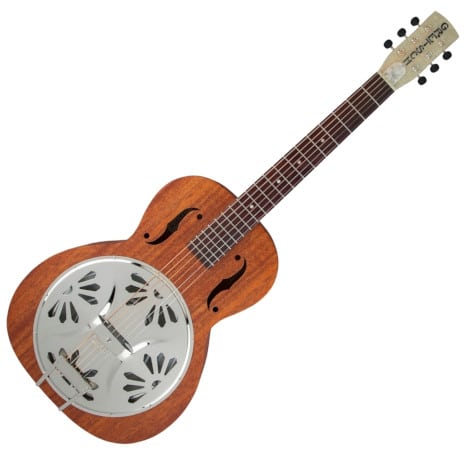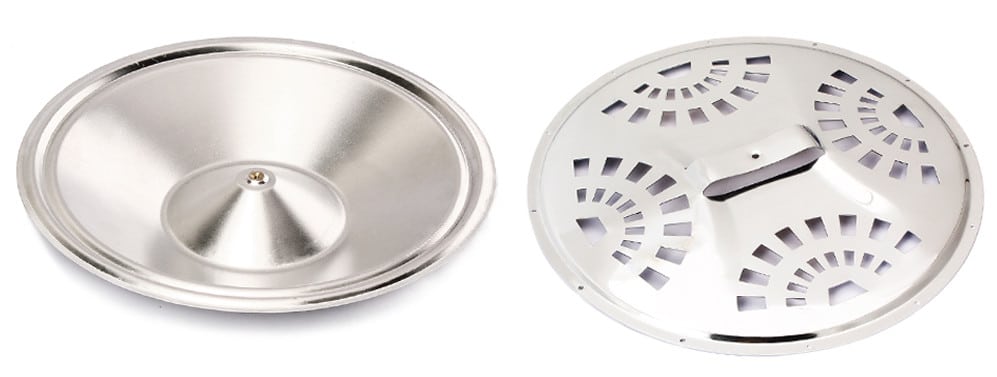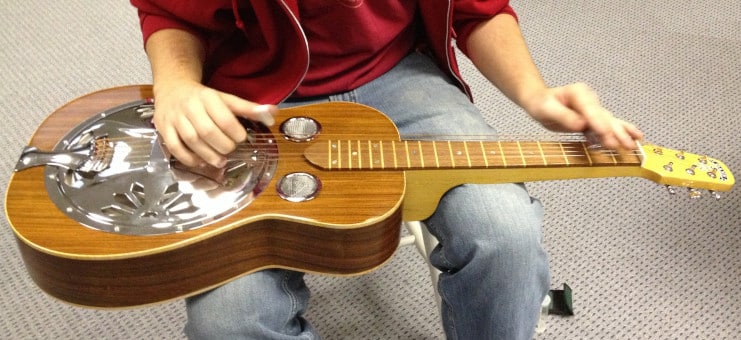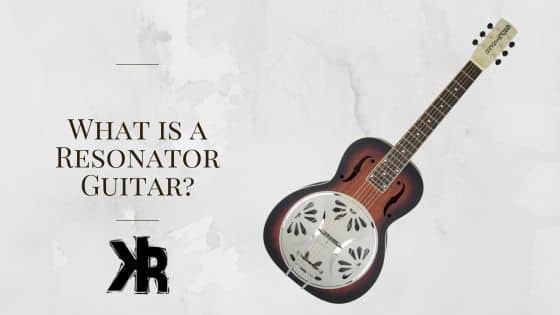Table of Contents
You’re sitting on the front porch, the sun is setting, and the warm breeze carries the unmistakable sound of a resonator guitar.
The twang and metallic richness of its notes evoke the spirit of American roots music and instantly transport you back to a simpler time. But what makes a resonator guitar so special and captivating?
In this edition of our Killer Rig series, we’ll look into the captivating realm of these extraordinary instruments, shedding light on their history, design, and the techniques that define their singular sound.
Whether you’re a musician or simply intrigued by the entrancing world of resonator guitars, this article is sure to resonate with your curiosity.
What is a Resonator Guitar?
A resonator guitar is a type of acoustic that uses metal cones to amplify its sound. This design results in a louder, more powerful sound with a fascinating metallic twang.
This sets it apart from traditional acoustic guitars that rely on a hollow wooden body for amplification.
Resonator guitars are available in various styles. Including round and square neck designs, as well as wood-bodied and metal-bodied options. They are closely associated with genres like blues and bluegrass, and are often played using fingerpicking and slide techniques.
Whether you’re a complete beginner or an experienced musician, the resonator guitar offers a captivating sound and versatile playing experience. One that can enrich your musical journey.

History of the Resonator Guitar
In the early 20th century, the need for louder acoustic guitars in the world of live music led to the invention of the resonator.
Two key figures, John Dopyera and George Beauchamp, joined forces to create a guitar that would produce a louder, more powerful sound. One capable of cutting through the noise of the bustling speakeasies and dance halls of the era.
The Invention
John Dopyera, a talented luthier, and George Beauchamp, a musician and entrepreneur, partnered in the late 1920s to address the limitations of traditional acoustic guitars.
Their collaboration resulted in the formation of the National String Instrument Corporation. A company dedicated to the development and production of resonator guitars.
Through experimentation and innovation, they introduced two models of resonator guitars to the market: the tricone and single-cone designs.
Early Development and Models
The tricone resonator guitar, their first creation, featured three small, interconnected cones that worked together to amplify the vibrations of the strings. This design provided an original, full-bodied sound that quickly gained popularity among musicians.
However, the tricone’s complexity and cost led John Dopyera to develop the single-cone resonator guitar. A more affordable and simplified version.
This design utilized a single, larger cone to amplify the sound. Ultimately, offering a slightly different tonal quality that would go on to shape the signature sound of delta blues and bluegrass music.
The Anatomy of a Resonator Guitar
By closely examining the structure of a resonator guitar, we can comprehend what differentiates it from other acoustic guitars. Central to the instrument is the resonator cone, tasked with enhancing the sound and imparting its unique auditory qualities.
The Resonator Cone
The resonator cone, usually made of aluminum or other metals, is a thin, conical structure that sits inside the guitar’s body.
As the strings vibrate, the resonator cone amplifies the sound by converting the vibrations into audible tones. This innovative design allows the resonator to produce a louder, more powerful sound than traditional acoustic guitars.

Different Neck Designs
Resonator guitars come in various styles and configurations. Each catering to different playing styles and preferences.
The two most common distinctions are the round and square neck designs, as well as the choice between wood-bodied and metal-bodied guitars.
Round neck resonators are played like standard guitars and are favored by blues and folk musicians. In contrast, square neck guitars are designed for lap steel or slide playing, a popular choice for bluegrass and country musicians.
Wood-bodied resonator guitars offer a warmer, more traditional tone. While metal-bodied guitars are known for their striking metallic twang and projection.
Both types have found their place in various music genres, allowing artists to select the one that best suits their sound.
Components of a Resonator Guitar
Besides the resonator cone, there are other essential components that make up the guitar. The bridge and saddle transfer the string vibrations to the resonator cone.
While the fingerboard and frets enable the musician to play different notes and chords. The tailpiece anchors the strings to the body. While the tuning machines allow the player to adjust the pitch of each string.
Understanding the anatomy of a resonator guitar is crucial in appreciating the innovation and craftsmanship behind this iconic instrument. Each component works together to create the unmistakable sound.
Different Types of Resonator Guitars
In addition to the round and square neck designs, resonator guitars can also be categorized by the specific design of the cone and bridge system. There are three primary types:
- Biscuit Bridge: The Biscuit Bridge resonator guitar features a single-cone design, with the cone facing upwards. The bridge, which supports the strings, is mounted on a round wooden or synthetic disc called the biscuit. This design is known for its focused, punchy sound and is popular among blues musicians.
- Tricone: As mentioned earlier, the Tricone was the first design created by John Dopyera and George Beauchamp. It features three small, interconnected cones that work together to amplify the guitar’s sound. Tricone guitars are known for their smooth, complex tonal qualities and are favored by players seeking a versatile, expressive instrument.
- Spider Bridge: The Spider Bridge resonator guitar utilizes a single-cone design with the cone facing downwards. The bridge is a metal, spider-like structure that connects the strings to the edges of the cone. This design produces a bright, crisp sound with excellent sustain, making it a popular choice for bluegrass and country musicians.
These different types each have their own tonal characteristics. Offering musicians a variety of options to find the perfect instrument for their preferred playing style and genre.
Sound and Playing Techniques
The resonator guitar has captivated musicians and audiences alike with its remarkable tone. But also the expressive playing techniques that have become synonymous with the instrument.
Tone Characteristics
The resonator guitar is renowned for its powerful projection and volume. This sets it apart from traditional acoustic guitars. The metal resonator cone creates a rich, resonant tone with a rare timbre.
One that has become a staple in various music genres. Its sound is often described as having a metallic twang, with a pronounced sustain that lends itself well to slide guitar techniques.
Fingerpicking and Bottleneck Slide Techniques
The resonator guitar is often played using fingerpicking and bottleneck slide techniques, which are widely used in delta blues and bluegrass styles. Fingerpicking involves plucking the strings with the fingertips or fingerpicks, creating a percussive and expressive sound.
The bottleneck slide technique, on the other hand, involves using a smooth, cylindrical object (usually a glass or metal slide) to press against the strings and change the pitch of the notes.
Iconic Resonator Guitar Players
Many musicians have adopted the resonator guitar and its playing techniques. Leaving a lasting impact on various music genres. Legendary blues musician Son House, known for his raw and emotive slide guitar performances, is one such artist.
Dobro players like Jerry Douglas and Josh Graves have also made their mark. Pushing the boundaries of bluegrass music with their virtuosic skills.
The resonator guitar’s tone and playing techniques have made it an iconic instrument in the world of music. Its versatility and rich history continue to inspire musicians to explore its potential and create captivating performances.

The Resonator Guitar in Modern Music
The resonator guitar continues to hold a special place in modern music. With its exclusive sound and expressive playing techniques, influencing various genres.
Let’s take a look at the resurgence and popularity of the resonator guitar in contemporary music. But also the impact it has had on diverse musical styles.
Popularity in Contemporary Music
The resonator guitar has experienced a resurgence in recent years, as musicians from various backgrounds have embraced its sound and versatility.
This renewed interest has led to an increased presence of resonator guitars in popular music. Spanning genres from indie rock to folk and beyond.
The Influence on Various Genres
Blues and bluegrass remain the cornerstone genres for resonator guitar. With countless musicians continuing to pay homage to the instrument’s roots.
However, the resonator guitar has also found its way into country, rock, and folk music. Artists are exploring new ways to incorporate its sound into their compositions.
Resonator Guitar Manufacturers
As demand for resonator guitars has grown, several manufacturers have risen to prominence. Offering a range of instruments to suit different tastes and budgets. National Reso-Phonic, Dobro, and Regal are among the most well-known brands.
They produce both traditional and modern resonator guitar designs. Custom and boutique builders have also emerged. Catering to discerning musicians seeking one-of-a-kind instruments with exceptional craftsmanship.
Conclusion
The resonator guitar, with its rich history and unmistakable sound, has left a mark on the world of music. From its early beginnings with John Dopyera and George Beauchamp.
The instrument has evolved into a diverse range of styles and designs, each offering rare sounds that cater to various musical genres. Whether it’s the emotive sounds of delta blues, the lively spirit of bluegrass, or the experimental tones of indie rock!
The resonator guitar continues to captivate musicians and audiences alike. I hope that you now understand what the resonator is and how you can use it in your music!
FAQs
Is a Resonator Guitar Hard to Play?
The level of difficulty in playing a resonator guitar can vary depending on its type. Square neck resonators can be quite challenging, considering they significantly deviate from standard guitars in terms of design and playing method.
Adapting to the style and movements required for playing slide guitar, typical of square neck resonators, can be time-consuming.
On the other hand, round neck resonators, which can be played like a regular guitar without necessarily using a slide, tend to be more accessible. They are typically designed for versatility, enabling both slide and non-slide playing.
Thus, transitioning from a standard acoustic or electric guitar to a round neck resonator is likely to be smoother and less problematic.
What is the main difference between a resonator and a regular acoustic?
The primary difference between a resonator guitar and a regular acoustic lies in the way they amplify sound. In a resonator, the sound is amplified through metal cones, which are mounted inside the guitar’s body.
This design produces a louder, more powerful sound with a brilliant metallic twang. In contrast, a regular acoustic guitar relies on the resonance of its wooden body to amplify the sound of the strings.
Can I play a resonator guitar with a regular pick, or do I need fingerpicks?
You can certainly play a resonator guitar with a regular pick if that is your preference. However, many resonator guitar players use fingerpicks, which are small, metal or plastic picks that fit over the fingertips.
Fingerpicks allow for a more percussive, expressive sound. They are especially suited for fingerpicking and slide techniques commonly associated with resonator guitars.
Is a resonator guitar suitable for a beginner?
A resonator guitar can be a great instrument for a beginner! Especially if you’re interested in playing blues, bluegrass, or other genres that prominently feature the instrument.
Keep in mind that the playing techniques and sound of a resonator guitar may differ from those of a traditional acoustic.
However, learning to play one can be a rewarding and enjoyable experience, providing you with a solid foundation in various playing styles and techniques.

